Unit Coordinating Course Reflection: Preparing for HUC Career
VerifiedAdded on 2023/05/28
|8
|1515
|87
Journal and Reflective Writing
AI Summary
This journal entry reflects on the Unit Coordinating course, detailing key learnings such as the required education, job description, and duties of a Health Unit Clerk (HUC). The author discusses the importance of communication skills, computer literacy, and maintaining patient confidentiality. The reflection explores the author's aspiration to work as a HUC, highlighting the appreciation for respect and culture within the role, enjoyment in managing patient documentation, and the rewarding aspect of assisting families with birth paperwork. Challenges, such as dealing with patient loss, are also acknowledged. The author emphasizes the expanded understanding of the Unit Clerk's role and the development of communication skills, with future goals including enhancing communication, understanding bioethics, and providing comprehensive patient care. The author expresses increased enthusiasm for the HUC career path due to the course's comprehensive overview. Desklib offers similar resources for students.
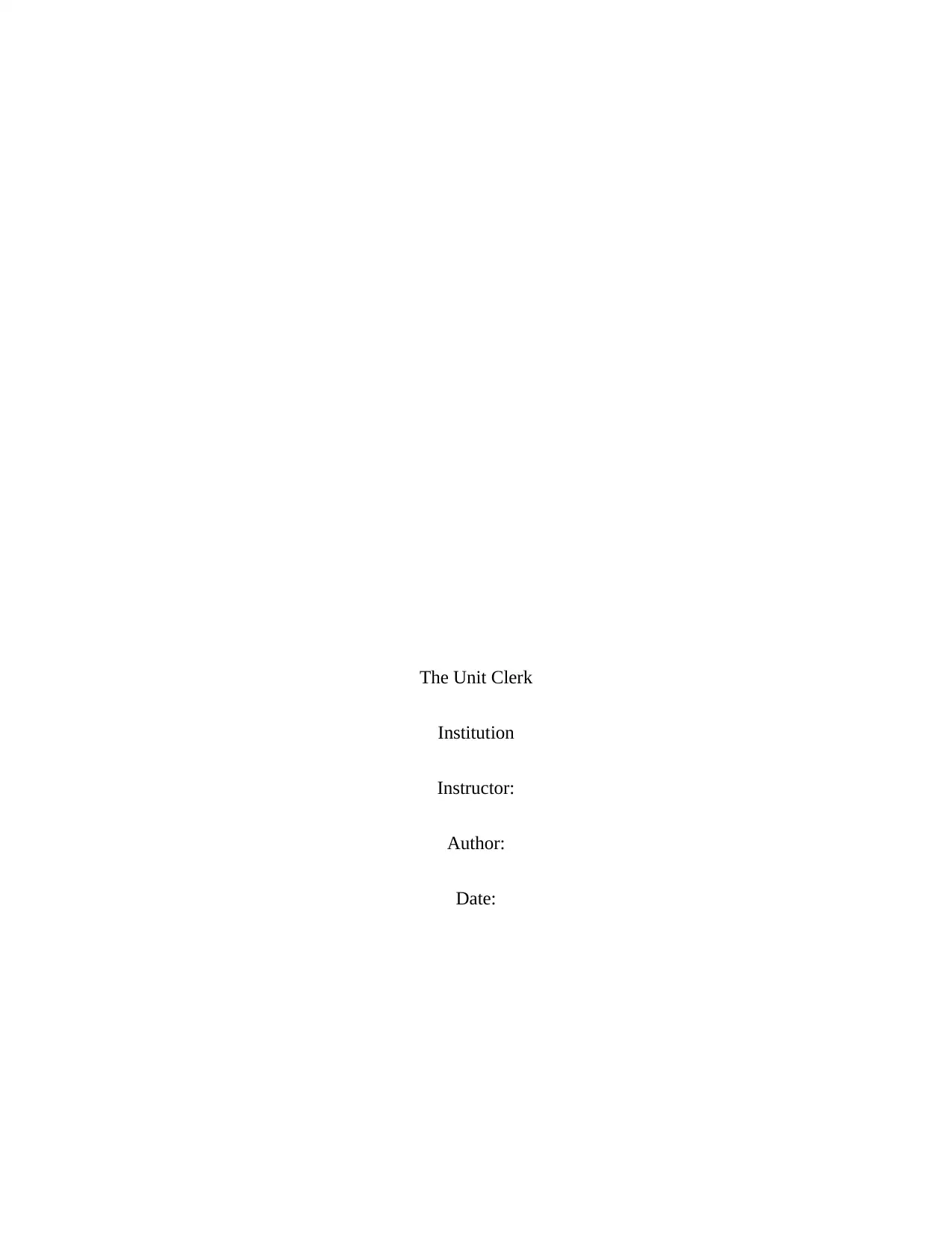
The Unit Clerk
Institution
Instructor:
Author:
Date:
Institution
Instructor:
Author:
Date:
Paraphrase This Document
Need a fresh take? Get an instant paraphrase of this document with our AI Paraphraser
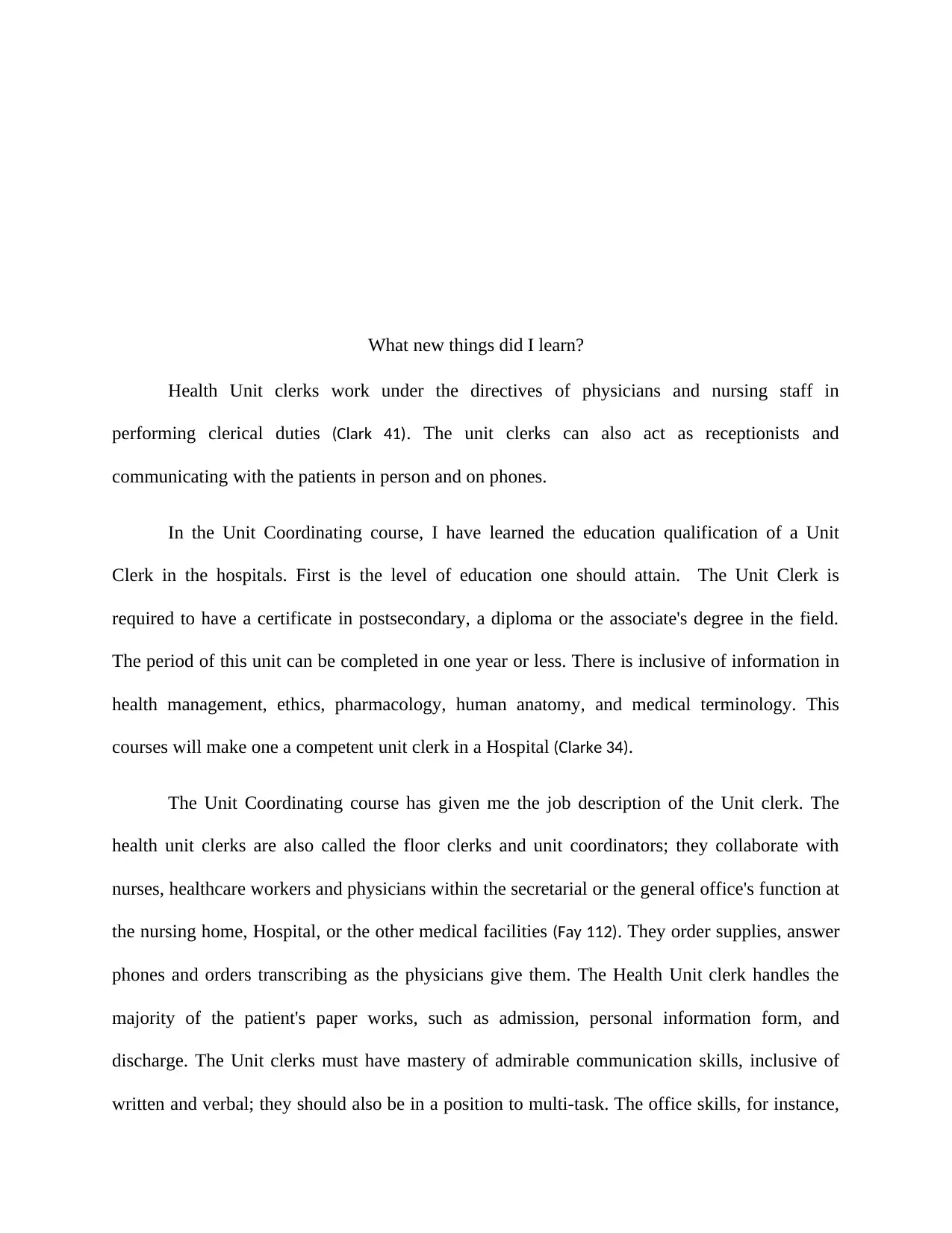
What new things did I learn?
Health Unit clerks work under the directives of physicians and nursing staff in
performing clerical duties (Clark 41). The unit clerks can also act as receptionists and
communicating with the patients in person and on phones.
In the Unit Coordinating course, I have learned the education qualification of a Unit
Clerk in the hospitals. First is the level of education one should attain. The Unit Clerk is
required to have a certificate in postsecondary, a diploma or the associate's degree in the field.
The period of this unit can be completed in one year or less. There is inclusive of information in
health management, ethics, pharmacology, human anatomy, and medical terminology. This
courses will make one a competent unit clerk in a Hospital (Clarke 34).
The Unit Coordinating course has given me the job description of the Unit clerk. The
health unit clerks are also called the floor clerks and unit coordinators; they collaborate with
nurses, healthcare workers and physicians within the secretarial or the general office's function at
the nursing home, Hospital, or the other medical facilities (Fay 112). They order supplies, answer
phones and orders transcribing as the physicians give them. The Health Unit clerk handles the
majority of the patient's paper works, such as admission, personal information form, and
discharge. The Unit clerks must have mastery of admirable communication skills, inclusive of
written and verbal; they should also be in a position to multi-task. The office skills, for instance,
Health Unit clerks work under the directives of physicians and nursing staff in
performing clerical duties (Clark 41). The unit clerks can also act as receptionists and
communicating with the patients in person and on phones.
In the Unit Coordinating course, I have learned the education qualification of a Unit
Clerk in the hospitals. First is the level of education one should attain. The Unit Clerk is
required to have a certificate in postsecondary, a diploma or the associate's degree in the field.
The period of this unit can be completed in one year or less. There is inclusive of information in
health management, ethics, pharmacology, human anatomy, and medical terminology. This
courses will make one a competent unit clerk in a Hospital (Clarke 34).
The Unit Coordinating course has given me the job description of the Unit clerk. The
health unit clerks are also called the floor clerks and unit coordinators; they collaborate with
nurses, healthcare workers and physicians within the secretarial or the general office's function at
the nursing home, Hospital, or the other medical facilities (Fay 112). They order supplies, answer
phones and orders transcribing as the physicians give them. The Health Unit clerk handles the
majority of the patient's paper works, such as admission, personal information form, and
discharge. The Unit clerks must have mastery of admirable communication skills, inclusive of
written and verbal; they should also be in a position to multi-task. The office skills, for instance,
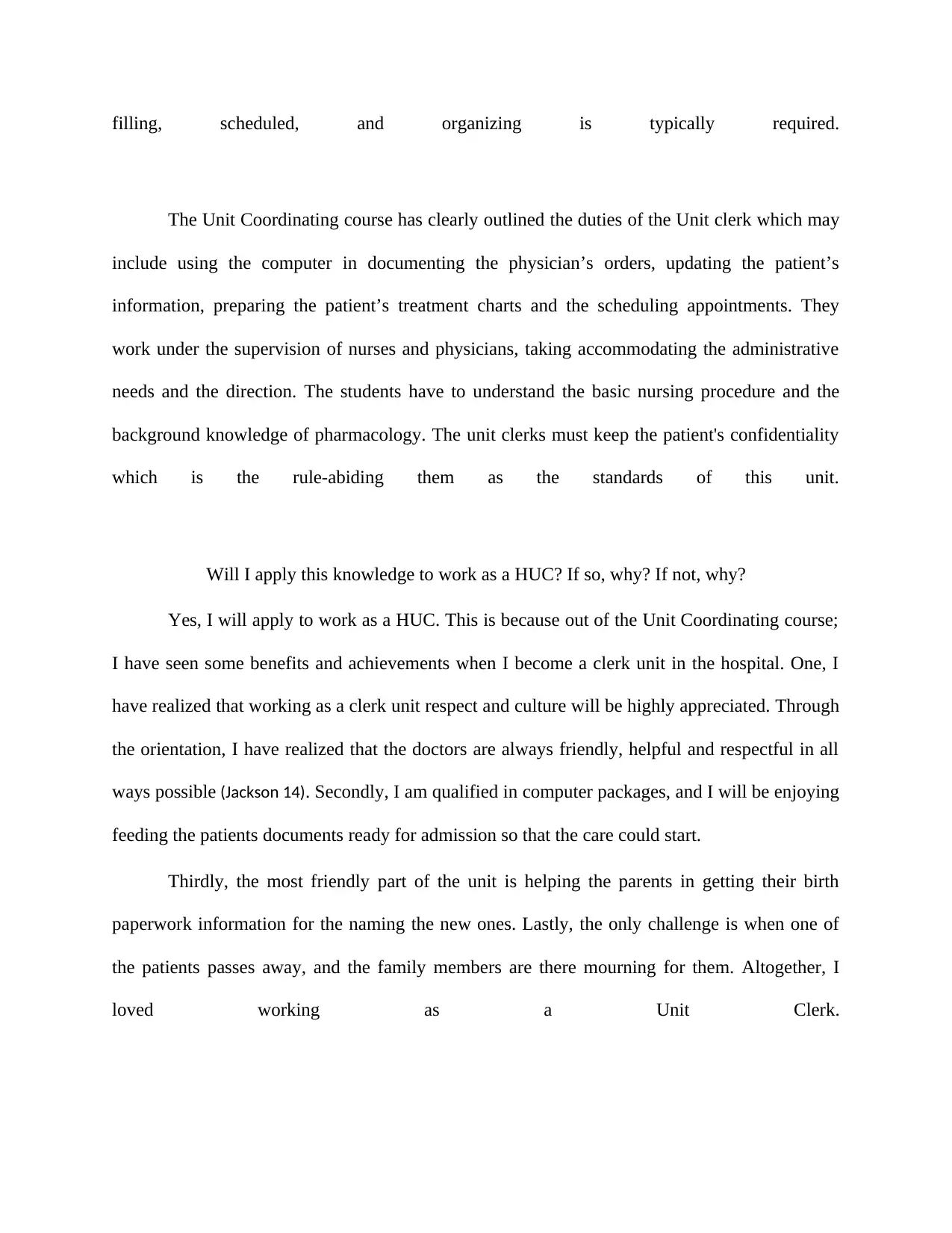
filling, scheduled, and organizing is typically required.
The Unit Coordinating course has clearly outlined the duties of the Unit clerk which may
include using the computer in documenting the physician’s orders, updating the patient’s
information, preparing the patient’s treatment charts and the scheduling appointments. They
work under the supervision of nurses and physicians, taking accommodating the administrative
needs and the direction. The students have to understand the basic nursing procedure and the
background knowledge of pharmacology. The unit clerks must keep the patient's confidentiality
which is the rule-abiding them as the standards of this unit.
Will I apply this knowledge to work as a HUC? If so, why? If not, why?
Yes, I will apply to work as a HUC. This is because out of the Unit Coordinating course;
I have seen some benefits and achievements when I become a clerk unit in the hospital. One, I
have realized that working as a clerk unit respect and culture will be highly appreciated. Through
the orientation, I have realized that the doctors are always friendly, helpful and respectful in all
ways possible (Jackson 14). Secondly, I am qualified in computer packages, and I will be enjoying
feeding the patients documents ready for admission so that the care could start.
Thirdly, the most friendly part of the unit is helping the parents in getting their birth
paperwork information for the naming the new ones. Lastly, the only challenge is when one of
the patients passes away, and the family members are there mourning for them. Altogether, I
loved working as a Unit Clerk.
The Unit Coordinating course has clearly outlined the duties of the Unit clerk which may
include using the computer in documenting the physician’s orders, updating the patient’s
information, preparing the patient’s treatment charts and the scheduling appointments. They
work under the supervision of nurses and physicians, taking accommodating the administrative
needs and the direction. The students have to understand the basic nursing procedure and the
background knowledge of pharmacology. The unit clerks must keep the patient's confidentiality
which is the rule-abiding them as the standards of this unit.
Will I apply this knowledge to work as a HUC? If so, why? If not, why?
Yes, I will apply to work as a HUC. This is because out of the Unit Coordinating course;
I have seen some benefits and achievements when I become a clerk unit in the hospital. One, I
have realized that working as a clerk unit respect and culture will be highly appreciated. Through
the orientation, I have realized that the doctors are always friendly, helpful and respectful in all
ways possible (Jackson 14). Secondly, I am qualified in computer packages, and I will be enjoying
feeding the patients documents ready for admission so that the care could start.
Thirdly, the most friendly part of the unit is helping the parents in getting their birth
paperwork information for the naming the new ones. Lastly, the only challenge is when one of
the patients passes away, and the family members are there mourning for them. Altogether, I
loved working as a Unit Clerk.
⊘ This is a preview!⊘
Do you want full access?
Subscribe today to unlock all pages.

Trusted by 1+ million students worldwide
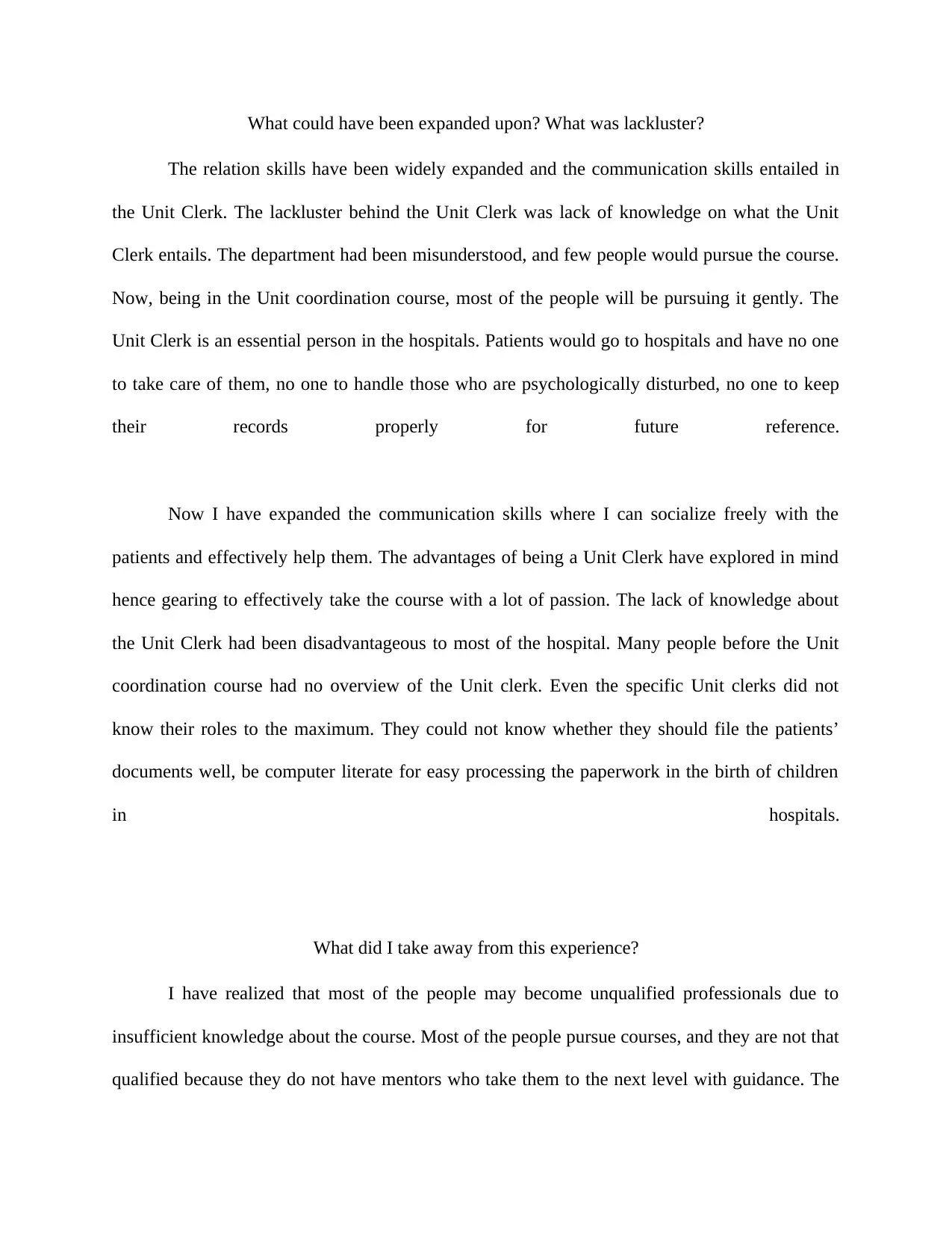
What could have been expanded upon? What was lackluster?
The relation skills have been widely expanded and the communication skills entailed in
the Unit Clerk. The lackluster behind the Unit Clerk was lack of knowledge on what the Unit
Clerk entails. The department had been misunderstood, and few people would pursue the course.
Now, being in the Unit coordination course, most of the people will be pursuing it gently. The
Unit Clerk is an essential person in the hospitals. Patients would go to hospitals and have no one
to take care of them, no one to handle those who are psychologically disturbed, no one to keep
their records properly for future reference.
Now I have expanded the communication skills where I can socialize freely with the
patients and effectively help them. The advantages of being a Unit Clerk have explored in mind
hence gearing to effectively take the course with a lot of passion. The lack of knowledge about
the Unit Clerk had been disadvantageous to most of the hospital. Many people before the Unit
coordination course had no overview of the Unit clerk. Even the specific Unit clerks did not
know their roles to the maximum. They could not know whether they should file the patients’
documents well, be computer literate for easy processing the paperwork in the birth of children
in hospitals.
What did I take away from this experience?
I have realized that most of the people may become unqualified professionals due to
insufficient knowledge about the course. Most of the people pursue courses, and they are not that
qualified because they do not have mentors who take them to the next level with guidance. The
The relation skills have been widely expanded and the communication skills entailed in
the Unit Clerk. The lackluster behind the Unit Clerk was lack of knowledge on what the Unit
Clerk entails. The department had been misunderstood, and few people would pursue the course.
Now, being in the Unit coordination course, most of the people will be pursuing it gently. The
Unit Clerk is an essential person in the hospitals. Patients would go to hospitals and have no one
to take care of them, no one to handle those who are psychologically disturbed, no one to keep
their records properly for future reference.
Now I have expanded the communication skills where I can socialize freely with the
patients and effectively help them. The advantages of being a Unit Clerk have explored in mind
hence gearing to effectively take the course with a lot of passion. The lack of knowledge about
the Unit Clerk had been disadvantageous to most of the hospital. Many people before the Unit
coordination course had no overview of the Unit clerk. Even the specific Unit clerks did not
know their roles to the maximum. They could not know whether they should file the patients’
documents well, be computer literate for easy processing the paperwork in the birth of children
in hospitals.
What did I take away from this experience?
I have realized that most of the people may become unqualified professionals due to
insufficient knowledge about the course. Most of the people pursue courses, and they are not that
qualified because they do not have mentors who take them to the next level with guidance. The
Paraphrase This Document
Need a fresh take? Get an instant paraphrase of this document with our AI Paraphraser
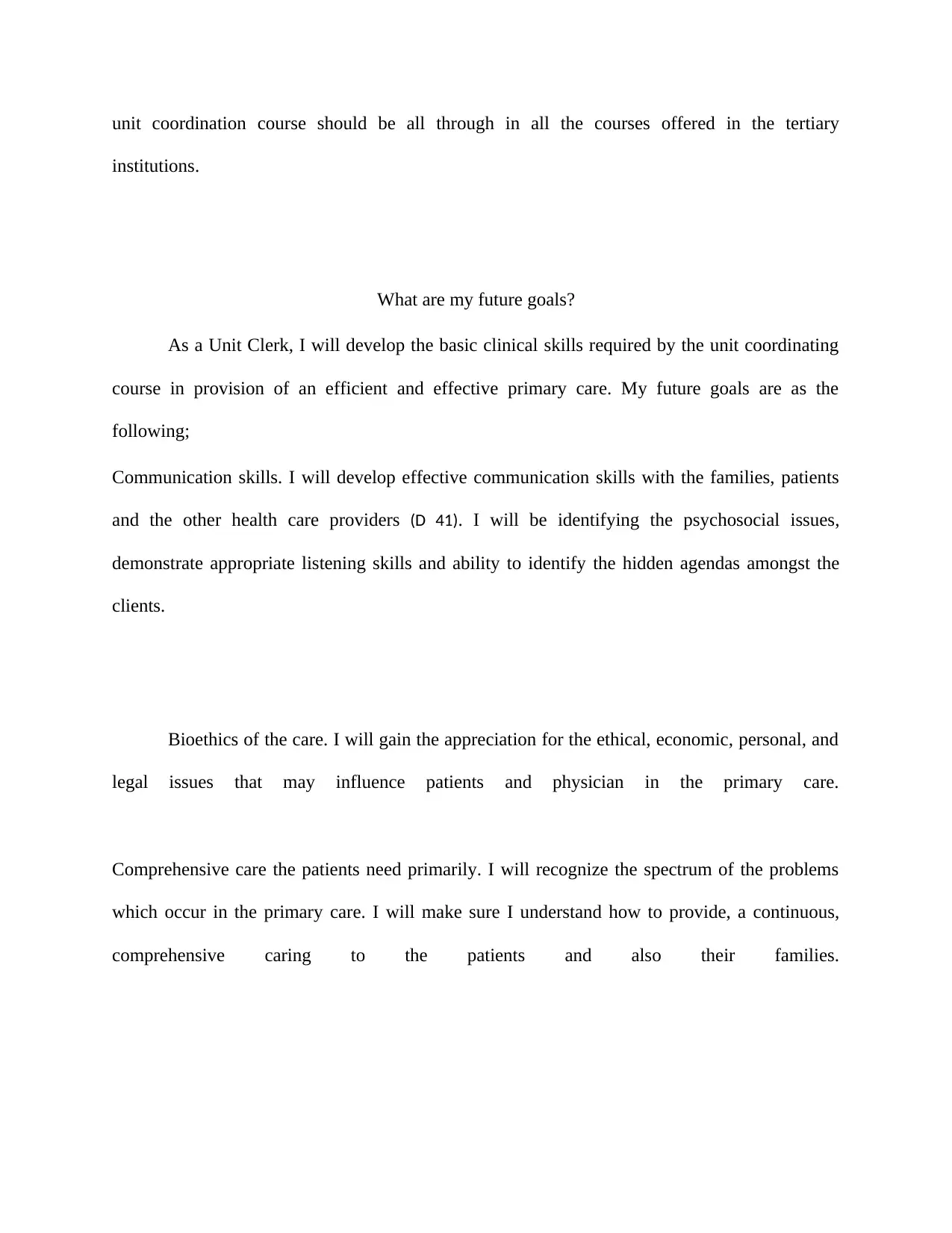
unit coordination course should be all through in all the courses offered in the tertiary
institutions.
What are my future goals?
As a Unit Clerk, I will develop the basic clinical skills required by the unit coordinating
course in provision of an efficient and effective primary care. My future goals are as the
following;
Communication skills. I will develop effective communication skills with the families, patients
and the other health care providers (D 41). I will be identifying the psychosocial issues,
demonstrate appropriate listening skills and ability to identify the hidden agendas amongst the
clients.
Bioethics of the care. I will gain the appreciation for the ethical, economic, personal, and
legal issues that may influence patients and physician in the primary care.
Comprehensive care the patients need primarily. I will recognize the spectrum of the problems
which occur in the primary care. I will make sure I understand how to provide, a continuous,
comprehensive caring to the patients and also their families.
institutions.
What are my future goals?
As a Unit Clerk, I will develop the basic clinical skills required by the unit coordinating
course in provision of an efficient and effective primary care. My future goals are as the
following;
Communication skills. I will develop effective communication skills with the families, patients
and the other health care providers (D 41). I will be identifying the psychosocial issues,
demonstrate appropriate listening skills and ability to identify the hidden agendas amongst the
clients.
Bioethics of the care. I will gain the appreciation for the ethical, economic, personal, and
legal issues that may influence patients and physician in the primary care.
Comprehensive care the patients need primarily. I will recognize the spectrum of the problems
which occur in the primary care. I will make sure I understand how to provide, a continuous,
comprehensive caring to the patients and also their families.
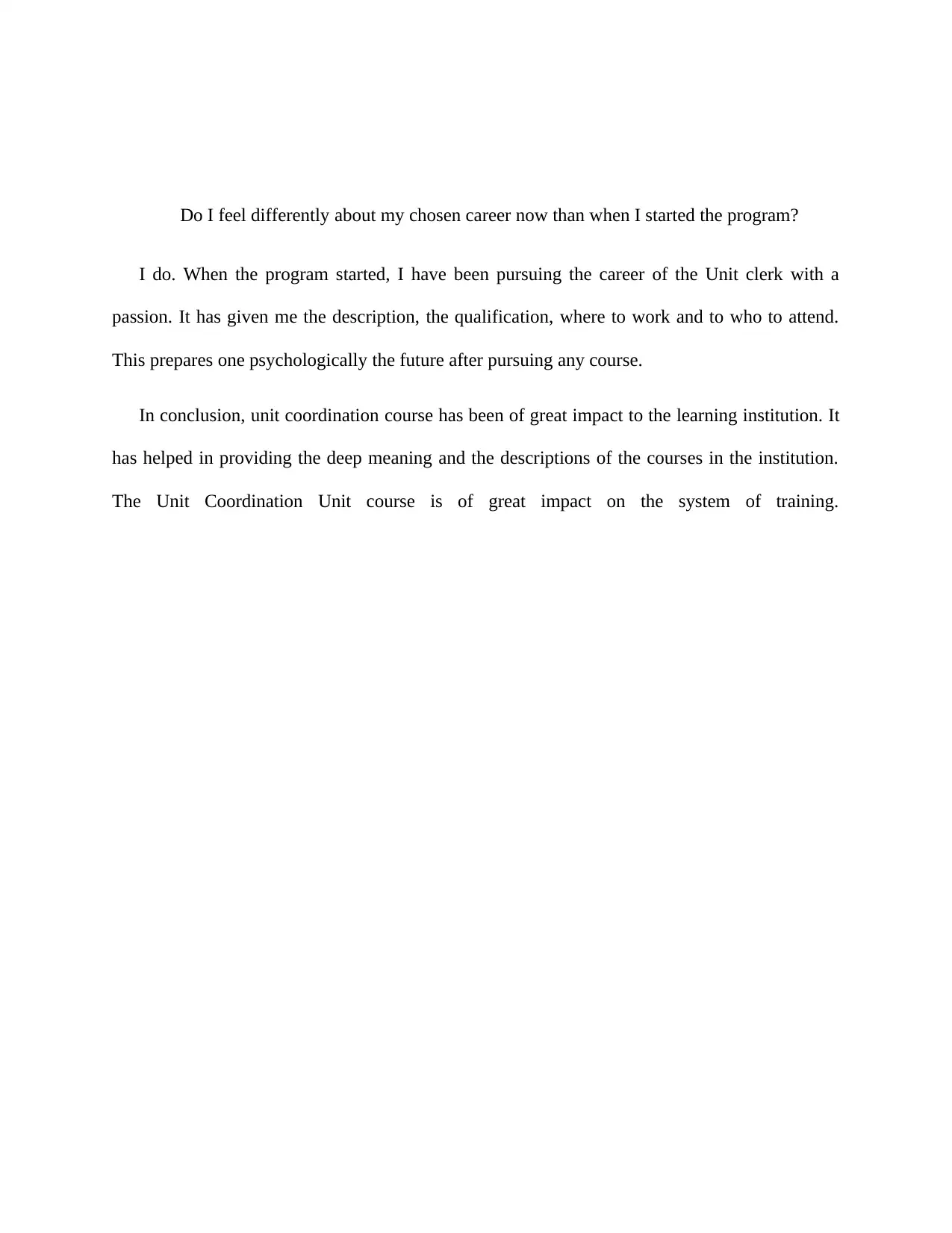
Do I feel differently about my chosen career now than when I started the program?
I do. When the program started, I have been pursuing the career of the Unit clerk with a
passion. It has given me the description, the qualification, where to work and to who to attend.
This prepares one psychologically the future after pursuing any course.
In conclusion, unit coordination course has been of great impact to the learning institution. It
has helped in providing the deep meaning and the descriptions of the courses in the institution.
The Unit Coordination Unit course is of great impact on the system of training.
I do. When the program started, I have been pursuing the career of the Unit clerk with a
passion. It has given me the description, the qualification, where to work and to who to attend.
This prepares one psychologically the future after pursuing any course.
In conclusion, unit coordination course has been of great impact to the learning institution. It
has helped in providing the deep meaning and the descriptions of the courses in the institution.
The Unit Coordination Unit course is of great impact on the system of training.
⊘ This is a preview!⊘
Do you want full access?
Subscribe today to unlock all pages.

Trusted by 1+ million students worldwide
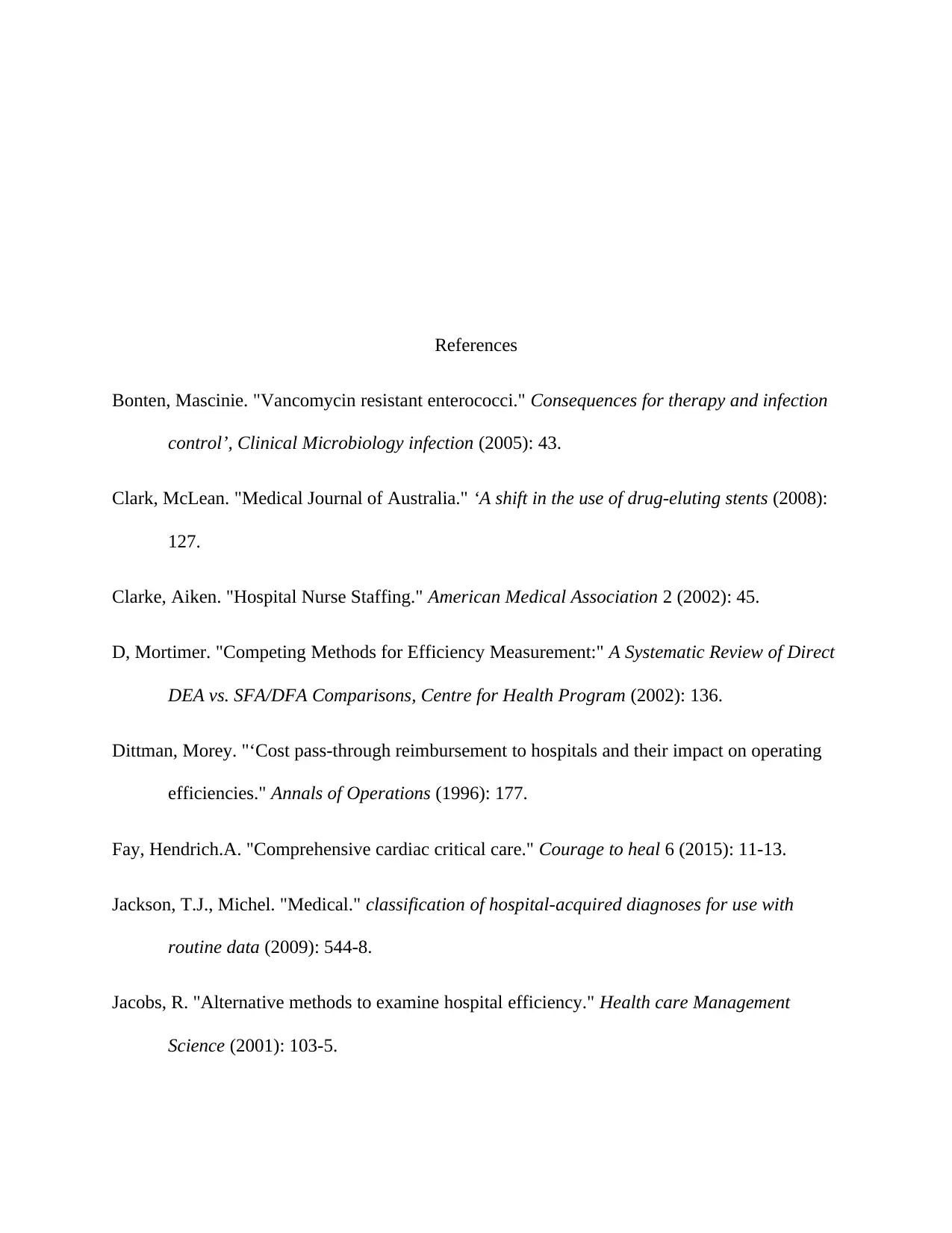
References
Bonten, Mascinie. "Vancomycin resistant enterococci." Consequences for therapy and infection
control’, Clinical Microbiology infection (2005): 43.
Clark, McLean. "Medical Journal of Australia." ‘A shift in the use of drug-eluting stents (2008):
127.
Clarke, Aiken. "Hospital Nurse Staffing." American Medical Association 2 (2002): 45.
D, Mortimer. "Competing Methods for Efficiency Measurement:" A Systematic Review of Direct
DEA vs. SFA/DFA Comparisons, Centre for Health Program (2002): 136.
Dittman, Morey. "‘Cost pass-through reimbursement to hospitals and their impact on operating
efficiencies." Annals of Operations (1996): 177.
Fay, Hendrich.A. "Comprehensive cardiac critical care." Courage to heal 6 (2015): 11-13.
Jackson, T.J., Michel. "Medical." classification of hospital-acquired diagnoses for use with
routine data (2009): 544-8.
Jacobs, R. "Alternative methods to examine hospital efficiency." Health care Management
Science (2001): 103-5.
Bonten, Mascinie. "Vancomycin resistant enterococci." Consequences for therapy and infection
control’, Clinical Microbiology infection (2005): 43.
Clark, McLean. "Medical Journal of Australia." ‘A shift in the use of drug-eluting stents (2008):
127.
Clarke, Aiken. "Hospital Nurse Staffing." American Medical Association 2 (2002): 45.
D, Mortimer. "Competing Methods for Efficiency Measurement:" A Systematic Review of Direct
DEA vs. SFA/DFA Comparisons, Centre for Health Program (2002): 136.
Dittman, Morey. "‘Cost pass-through reimbursement to hospitals and their impact on operating
efficiencies." Annals of Operations (1996): 177.
Fay, Hendrich.A. "Comprehensive cardiac critical care." Courage to heal 6 (2015): 11-13.
Jackson, T.J., Michel. "Medical." classification of hospital-acquired diagnoses for use with
routine data (2009): 544-8.
Jacobs, R. "Alternative methods to examine hospital efficiency." Health care Management
Science (2001): 103-5.
Paraphrase This Document
Need a fresh take? Get an instant paraphrase of this document with our AI Paraphraser
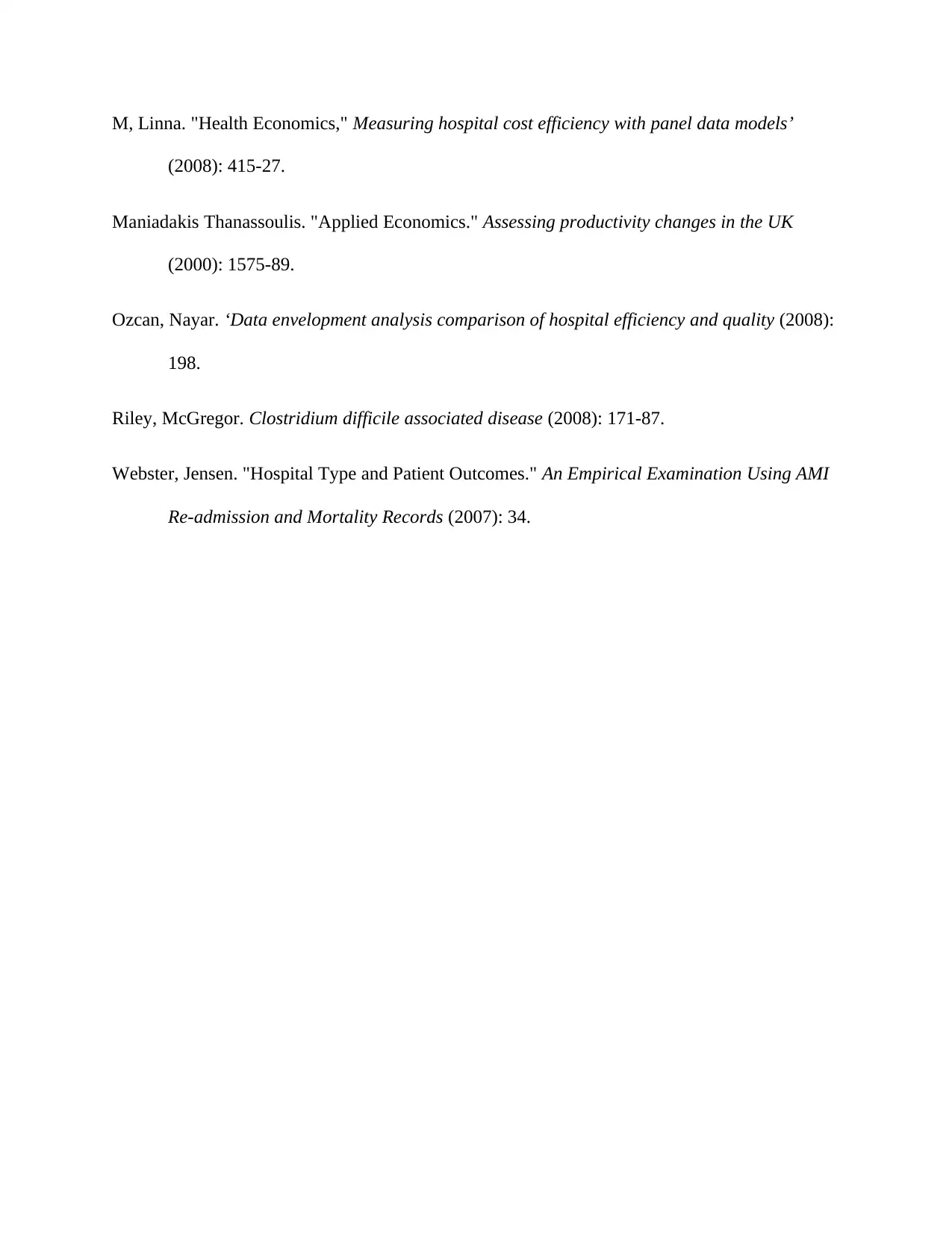
M, Linna. "Health Economics," Measuring hospital cost efficiency with panel data models’
(2008): 415-27.
Maniadakis Thanassoulis. "Applied Economics." Assessing productivity changes in the UK
(2000): 1575-89.
Ozcan, Nayar. ‘Data envelopment analysis comparison of hospital efficiency and quality (2008):
198.
Riley, McGregor. Clostridium difficile associated disease (2008): 171-87.
Webster, Jensen. "Hospital Type and Patient Outcomes." An Empirical Examination Using AMI
Re-admission and Mortality Records (2007): 34.
(2008): 415-27.
Maniadakis Thanassoulis. "Applied Economics." Assessing productivity changes in the UK
(2000): 1575-89.
Ozcan, Nayar. ‘Data envelopment analysis comparison of hospital efficiency and quality (2008):
198.
Riley, McGregor. Clostridium difficile associated disease (2008): 171-87.
Webster, Jensen. "Hospital Type and Patient Outcomes." An Empirical Examination Using AMI
Re-admission and Mortality Records (2007): 34.
1 out of 8
Related Documents
Your All-in-One AI-Powered Toolkit for Academic Success.
+13062052269
info@desklib.com
Available 24*7 on WhatsApp / Email
![[object Object]](/_next/static/media/star-bottom.7253800d.svg)
Unlock your academic potential
Copyright © 2020–2026 A2Z Services. All Rights Reserved. Developed and managed by ZUCOL.





